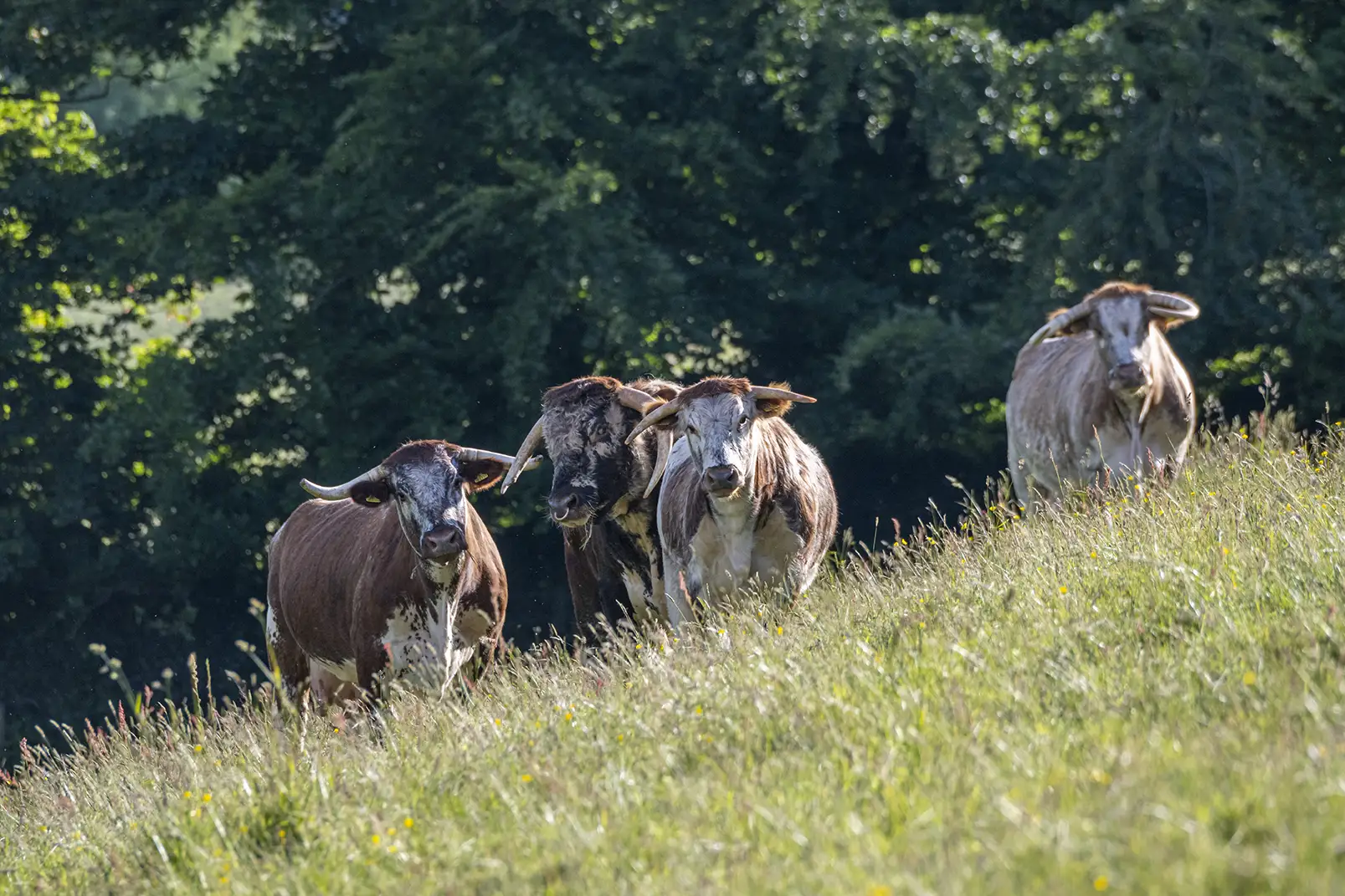A better future for food

Regenerative Farming
At Rare & Pasture we support regenerative farming by sourcing our meat from regenerative farms that are committed to improving the environment and the welfare of their animals.
What is Regenerative Farming?
Regenerative derives from the word “regenerate”, which means to grow, restore and bring new life after a loss or damage to life, and that is exactly what regenerative farming aims to do.
Regenerative farming is a farmer led movement aimed at reversing the environmental degradation caused by heavily industrialised farming. It starts from the soil up – when soils are healthy, they grow more nutritious crops and pasture, which in turn support healthier animals. By managing livestock more naturally and working with the environment, regenerative farming improves animal welfare, rebuilds habitats and restores the biodiversity lost to intensive systems, all while producing nutritious, better tasting meat.
The Core Regenerative Principles
- Minimise soil disturbance
- Healthy soils are alive with microbes, fungi and insects. When the soil is disturbed less, that living ecosystem can flourish, helping plants to thrive, making the land more resilient, and creating a valuable carbon sink.
- Reduce the use of chemicals and use manure responsibly
- Reducing the use of chemicals protects soil life, nearby waterways and the surrounding environment from pollution. When manure is used carefully, they recycle nutrients and support healthier soils without causing pollution.
- Keep the soil covered and roots in the soil
- Bare soil is vulnerable to erosion and drought. Living roots and plant-cover shield the surface, build structure and feed the organisms that make soil fertile.
- Maintain a diverse range of crops and improve biodiversity
- There is no such thing as a monoculture in nature. Farms with varied crops, hedgerows and habitats are more resilient, support more wildlife and produce healthier ecosystems overall.
- Integrate grazing animals in land management and crop cycles
- Well managed grazing mimics natural herd movement. Animals return nutrients through their manure, gently break up the surface with their hooves which encourages deeper roots and aerate the soil, improving the overall soil health.
- Building animal welfare into all aspects of the supply chain
- Regenerative farming should ensure high animal welfare. Animals that can express natural behaviours in well-designed regenerative systems are healthier and happier.
Why Regenerative Farming Matters
For decades, farmers were incentivised to maximise yields, leading to an industrialised system reliant on artificial fertilisers, pesticides and mass-produced industrialised livestock systems. This has resulted in the pollution of water, air, soil, and widespread environmental degradation.
Regenerative farming aims to turn this around, recognising the importance of our soil and the surrounding environment for the sustainability of farming, the health of our planet, people, animals.
At Rare & Pasture, we believe that meat should be produced in a way that benefits our environment and ensures high animal welfare. That’s why we source from regenerative farms all committed to caring for their land, their animals and the future of farming.
Tastes Good. Does Good.
The Outcomes of Regenerative Farming
- Healthier soils: Improved soil structure increases water retention, drainage efficiency, and aeration, creating a healthier soil ecosystem. As well as a thriving community of microbes, fungi and insects keeping nutrients cycling and plants well fed.
- Richer biodiversity: More varied crops, grasses and hedgerows create habitats for pollinators, birds and other wildlife above and below ground.
- Mitigates climate change:Using less machinery and fewer synthetic inputs helps cut on-farm greenhouse gas emissions. Whilst, healthy soils and plants draw carbon dioxide from the air and lock it into the ground, turning farmland into a carbon sink.
- Reduces chemical use: With healthier soils and improved biodiversity, farms can use fewer synthetic fertilisers and pesticides. That means less water pollution and a safer environment for people and wildlife.
- Improves animal welfare: By providing animals with space to roam and graze, and the freedom to express natural behaviours, they enjoy lower stress lives and higher welfare.
- Creates exceptional tasting, nutritious food: Regenerative, slow grown, grass fed animals results in tastier meat with healthier unsaturated fats, rich in the antioxidant beta carotene, as